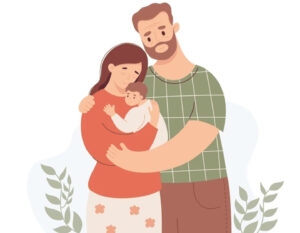
 Post Category - ExpertsExperts - Post Category - BabyBaby
Post Category - ExpertsExperts - Post Category - BabyBaby Post Category - PostnatalPostnatal - Post Category - Health & FitnessHealth & Fitness - Post Category - ParentingParenting
Post Category - PostnatalPostnatal - Post Category - Health & FitnessHealth & Fitness - Post Category - ParentingParentingGet prepared for a magical, yet exhausting, time ahead.
We all know that pregnancies last for three trimesters, however, with a large majority of antenatal education focusing on your pregnancy and birth journeys, what is not often discussed is the postnatal period known as the “fourth trimester” and the impact it can have on both mum and baby.
Once the wonder and intensity (and adrenaline!) of birth settles down, your new family enters the fourth trimester, which refers to roughly the first 12 weeks postpartum. During this time there are many changes, both physical and psychological, occurring for mum and baby. Understanding and anticipating these changes and their implications can help all members of the family navigate this special time.
Read more: How To Choose Baby Names And Avoid Disagreements

What’s in store for baby?
Having been comfortably nestled in your womb for nine months in a warm, dark, cosy and hunger-free home means that adjusting to life in an environment full of new experiences and stimuli can come as quite a shock to your newborn! As new mums, you will be well aware of the fact that you’re no longer pregnant, but your little one won’t have a clue as to what has just happened or why. It’s understandable that, with the significant adjustments and changes that have occurred, babies are likely to cry more during this 12-week period than at any other time in their lives. It’s important to know that you can never spoil your baby or give them too much physical touch and affection. As baby adjusts to its new normal, its ultimate source of security and comfort will be in the arms of family members – think plenty of skin to skin contact, cluster feeds, cuddles, walks around the block and lazy days spent together on the sofa.
By the end of the fourth trimester, parents will have watched their little one go through a remarkable physical, mental and social transformation. After the first week or so, your baby will be gaining at least 20 to 30 grams of weight each day, feeding on-demand at least eight to ten times in a 24-hour period to meet their needs. Your newborn’s eyesight will also go from blurry to bright in the first few months. During week one, newborns can only see objects 8 to 12 inches from their face and they can’t yet see in colour. Bold black and white geometric prints and toys can provide great sources of stimulation in the early days and weeks as the baby’s vision is rapidly improving. By three months old, your baby will be able to recognise faces, track objects, study its own hands and feet, and maintain eye contact for longer periods of time.

During the fourth trimester and beyond, it’s important that newborns begin to develop the important muscles associated with movements to lift their head in the upper back, neck, arms and shoulders. The way to facilitate this is by starting with plenty of “tummy time” as soon as you arrive home from the hospital. Placing your baby on their stomach on a comfortable, flat surface (always under a watchful eye) for a few minutes, several times a day can hugely aid their muscular development. However, your baby may not enjoy it too much at first! A few tips to help baby enjoy tummy time are getting down to its level to soothe them with your voice, massaging its feet and placing a mirror nearby so it can take a good look at its tummy time achievements!
Read more: Breastfeeding And Lactation Consultants In Hong Kong

What’s in store for mama?
Your baby won’t be the only one adjusting and adapting during the fourth trimester – mums get their fair share of this too! Your body experiences significant changes during pregnancy and the same can be said for after labour and delivery. While there’s a wealth of information and resources out there to educate us on pregnancy, labour and delivery, mum’s post-birth health and recovery can often get placed at the end of the priority list as your new baby’s needs take precedence. The practice of self-care in the postpartum period is more important than ever as, alongside the wonderful rush of oxytocin (also known as the love hormone) you receive, comes a notable decrease in your levels of estrogen and progesterone, which can contribute to the onset of the “baby blues”. Just remember that you’re not alone in your experiences! It’s okay to stay in your pjs all day, feel a little overwhelmed, take a nap or need a moment to yourself – these feelings are all completely normal. Be sure to allow yourself time for your mind, body and hormones to adjust to your new routine.
It will also take a few days and weeks for some of the physical changes to settle post-birth. During pregnancy, your uterus grew from the size of a small pear to more akin to a large watermelon, which then takes around six weeks to contract back down to pre-pregnancy size. This process is associated with mild bleeding, usually much less than a period, and light cramping sensations in the lower abdomen. Remember to regularly exercise your pelvic floor post-birth by doing pelvic floor (also known as Kegel) exercises a few times each day. Minimise the risk of back pain, shoulder discomfort and repetitive strain injuries by ensuring you are comfortable and well supported whilst feeding and holding your baby.
The first few weeks with your newborn may feel somewhat like a whirlwind of highs, lows and everything in between! Make sure to only set yourself modest and realistic goals for the day and to prioritise your recovery alongside caring for your new little bundle. Your baby will give you its first smile at around four to six weeks – that will be the most wonderful reward for all your hard work during the fourth trimester, and beyond!
Read more: Where To Buy Nursing Bras In Hong Kong
 View All
View All


 View All
View All


 View All
View All View All
View All


 View All
View All





